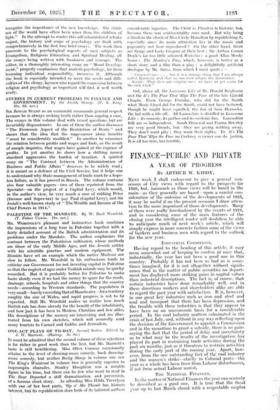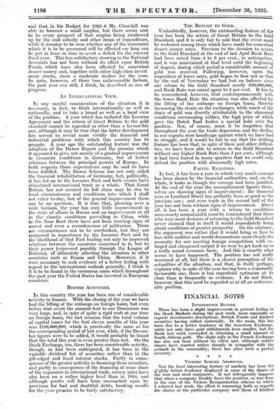FINANCE-PUBLIC AND PRIVATE-
A YEAR OF PROGRESS
By ARTHUR W. KIDDY.
NEXT week I• shall endeavour to give a general con- sensus of City views with regard to the prospects fOr 1926, but, inasmuch as those views will -be based in the main—as they generally are based—upon a careful con- sideration of the outcome of the developments of 1925, it may be useful if on the present occasion I draw atten- tion to the more important of those developments. Many of them were really foreshadowed by the events of 1924, and in considering some of the main features of the closing year the intelligent reader will doubtless be able to anticipate much of next week's article, which will simply express in more concrete fashion some of the views of bankers and business men with regard to the outlook for the new year.
INDUSTRIAL CONDITIONS.
Having regard to the heading of this article, it may seem somewhat out of keeping to confess at once that, industrially, the year has not been a good one in this country. Probably it has not been as bad as is some- times imagined, for it is not altogether without signifi- cance that in the matter of public securities no depart- ment has displayed more striking gains in capital values than industrial descriptions. The fact is, of course, that certain industries have done remarkably well, and in these directions workers and shareholders alike are able to regard the past year with satisfaction. It is, however, in our great key industries such as iron and steel and coal and transport that there has been depression, and the trouble with these industries is that they appear to have been on an uneconomic basis for a considerable period. In the coal industry matters culminated in the crisis of last July, and, without in any way reflecting upon the decision of the Government to appoint a Commission and in the meantime to grant a subsidy, there is no gain- saying the fact that the period of delay and uncertainty as to what may be the results of the investigation has played its part in restraining trade activities during the past six months, just as it threatens to restrain activities during the early part of the coming year. Apart, how- ever, from the one outstanding fact of fir coal industry and the seamen's strike—chiefly in Colonial ports—the year as a whole has been freer from Labour disturbances, if not from actual Labour unrest.
TIIE NATIONAL FINANCES.
III the matter of National Finances the year can scarcely be described as a good one. It is true that the fiscal year up to last March closed with a respectable surplus and that. in . his Budget, for. 1925-6. Mr. Churchill was able to forecast a small surplus, but there seems now to be every prospect of that surplus being swallowed up by the coal subsidy and other items of expenditure, while it remains to be seen whether any of the economies which it is to be presumed will be effected ere long can be put in force in time to avert a deficit for the current fiscal year. This less satisfactory showing in the National Accounts has not been without its effect upon British Funds, which have also been affected by somewhat dearer money and, together with other high-class invest ment stocks, show a moderate decline for the year. In spite, however, of these two unfavourable faclors, the past year can still, I think, be described as one of progress.
AN INTERNATIONAL VIEW. • In any careful consideration of the situation it is necessary, in fact, to think internationally as well as nationally, and to take a broad as well as a local view of the position. A year which has included the Locarno Agreement and the return of Great Britain to the gold standard cannot be regarded as other than a favourable one, although it may be true that the latter development has served to reveal more vividly the financial and industrial problems with which this country has to grapple. A year ago the outstanding feature was the adoption of the Dawes Report and the promise which it appeared to give, not merely of a gradual improvement ip economic conditions in Germany, but of better relations between the principal powers of Europe. In both respects those expectations may be said to have been fulfilled. The Dawes Scheme has not only aided the financial rehabilitation of Germany, but, politically, it has led on to the Locarno Pact and both events have stimulated international trade as a whole. That Great Britain has not secured its full share may be due to local circumstances and conditions into which I shall not enter to-day, but of the general improvement there can be no question. It is true that, glancing over wide horizon, the year has seen little improvement in the state of affairs in Russia and no improvement at all in the chaotic conditions prevailing in China, while in the Near East there have not been wanting signs of unrest and even a recrudescence of militarism. These are circumstances not to be overlooked, but they are surpassed in importance by the Locarno Pact and by the likelihood of that Pact leading not only to improved relations between the countries concerned in it, but to their power (expressed possibly through the League of Nations), of ultimately affecting the situation in other countries such as Russia and China. Moreover, if it were necessary to seek evidence of a better feeling with regard to the international outlook generally, I think it it is to be found in the enormous sums which throughout the past year the United States has invested in European countries.
BRITISH Acrivrms.
In this country the year has been one of considerable activity in finance. With the closing of the year we have had the lifting of the embargo on foreign loans, but even before that event the amount lent to our Dominions was very large, and, in spite of quite a rigid curb at one time on foreign loans, the fact remains that the total volume of capital issues for the first eleven months of this year was £195,000,000, which is practically the same as for the corresponding period of last year, while, if the Decem- ber figures were to be added, it would probably be found that the total this year is even greater than last. On the Stock Exchange, too, there has been considerable activity, though, as had been anticipated, it has been in the variable dividend list of securities rather than in the gilt-edged and fixed interest stoeks. Partly in conse- quence of the gieater activity in financing these securities, and partly in consequence of the financing of some share of the expansion in international trade, money rates have also been on a rather higher level than in 1924, and although profits will have been encroached upon by provision for bad and doubtful debts, banking results for the year prosaise to be fairly satisfactory. THE RETURN TO GOLD.
Undoubtedly, however, the outstanding feature of the year has been the return of Great Britain to the Gold Standard, and it is only fair to add that the event must be reckoned among those which have made for somewhat dearer money rates. Previous to the decision to return to the Gold Standard at the end of last April Bank Rate had been raised from 4 to 5 per cent., in anticipation, and it was maintained at that level until the beginning of August, during which period a considerable amount of gold was received. Following, however, upon the imposition of lower rates, gold began to flow out so that by the end of November we had lost on balance since our return to the Gold Standard nearly £10,000,000, and Bank Rate was raised again to 5 per cent. It has to be remembered, however, that contemporaneously with the lower Bank Rate the situation was also affected by the lifting of the embargo on foreign loans, thereby increasing the strain on the exchanges, while much of the drain of gold was directly attributable to the abnormal conditions surrounding rubber, the high price of which gave the Dutch East Indies a special hold over the position. Nor, of course, must it be forgotten that throughout the year the trade depreSsion and the decline in our exports were handicaps against which we have had to struggle, and it would be fair to say that the striking feature has been that, in spite of these and other difficul- ties, we have been able to return to the Gold Standard without any higher Bank Rate than 5 per cent., although it had been feared in many quarters that we could only defend the position with abnormally high rates.
FACING REALITIES.
In fact, it has been a year in which very much courage. has been shown by the financial authorities, and, on the, whole, it looks as though the courage had been justified. At the end of the year the unemployment figures them- selves are showing signs of improvement ; the financial year in Lombard Street has probably been as good as the previous one ; and even trade in the second half of the year has not been without signs of improvement. -Above all, it has been a year with a return to conditions more nearly normal and it must be remembered that those who were most desirous of returning to the Gold Standard never claimed that in itself it would immediately bring about conditions of greater. prosperity.. On the contrary, the argument was rather that it would bring us face to face with realities and would demonstrate more clearly the necessity for our meeting foreign competition with en- larged and cheapened output if we were to get back on to a really sound economic basis. And this is exactly what seems to have happened. The position has not really worsened at all, but there is a clearer perception of the actualities of the situation, and that, in itself, perhaps, explains why in spite of the year having been a reasonably favourable one, there is less superficial optimism at its close than is frequently in evidence. I do not think, however, that this need be regarded as at all an unfavour- able position.







































 Previous page
Previous page